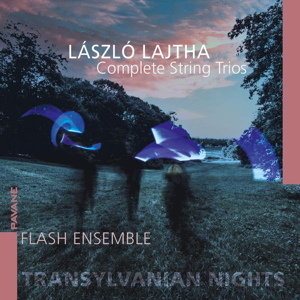
László Lajtha (1982-1963)
Sérénade Op.9 (1927)
String Trio No.2 Op.18 (1932)
Soirs transylvains Op.41 (1945)
Flash Ensemble
rec. 2021/22, Arsonic, Mons, Belgium
Pavane ADW7601 [78]
László Lajtha was a Francophile. He often gave French titles to his works, like the first and third string trios. The first is actually a Sérénade. The title signals what the piece contains, and how much in tune it is with French fashion of its time. It is a suite of character pieces to be experienced as a short ballet, in an overtly neoclassical language with Hungarian accents. We have a lively Marcia, Canzonetta, Fox Trot (somewhat reminiscent of the humour of the Groupe des Six in their early years), Scherzo, Dialogue and nother Marcia. The programme, if any, imagines a group of musicians serenading one of their member’s sweetheart. They dance; they make unwelcome uproar until the beloved one’s window finally opens. All that is left for them to do is retreat into the night. So, the mood and manner of the work are those of a divertimento cast in easy-going, light-footed but skilfully wrought music.
Lajtha dedicated String Trio No. 2 to the French writer Romain Rolland, who was once regarded as “the conscience of Europe”. Clearly, the piece was the composer’s significant utterance. It had to wait 27 years for its first performance during the Budapest Music Weeks. Lajtha’s response to the diktats of the Communist regime resulted in an almost complete ban on his music. He also refused the Kossuth Prize the government gave him for his ethnographic work – not for his substantial musical output – even if he was facing severe financial problems. I believe this digression allows us to appreciate Lajtha’s intellectual and moral attitude and unflinching honesty, and it may explain the importance of the String Trio No.2 asone of his most substantial chamber works.
The piece has four movements. The short, highly contrapuntal first movement has a sternness poles apart from the light-hearted mood of Sérénade. TheMolto presto e lesto is the longest and weightiest movement. It develops at some length folk-influenced thematic material (often akin to Bartók’s “imaginary folklore”) of some considerable energy. The Adagio brings respite and relief of tension, but the music is still far from appeased. The Allegro finale brings some brighter and sunnier moments. Viktória Ozsvárt’s fine insert notes – which I acknowledge with gratitude – mention the optimistic attitude of Romain Rolland’s hero, Colas Breugnon. This is a deeply serious, strictly articulated, hefty piece of music, overlooked for far too long (and maybe even now). This recording might draw attention to one of the 20th century’s finest chamber works.
Lajtha’s third string trio, Soirs transylvains, may be better known. The composer spent many years in Transylvania, then part of Hungary, exploring and studying Transylvanian folk music – as Bartók and Kodaly did earlier – and he always felt at home there. Transylvanian folk music often permeates Lajtha’s works, allusions rather than direct quotes. Soirs transylvains may be experienced as the composer’s take on the subject of the four seasons. The music is wonderfully varied, colourful, warmly lyrical and full of earthy joie de vivre. There are serious or pensive episodes, too. The first movement is basically a large-scale Rondo. The second movement’s mood is rather elegiac; the third one is rhythmically quite complex. In the fourth movement, Lajtha quotes an actual Transylvanian folk tune.
According to Viktória Ozsvárt, the ending has clearly political overtones:. The score carries “an outcry” (“Out of Transylvania”), and then viola and cello play an ostinato that may symbolize the march of the military forces. Later, the violin plays a cadenza-like melody of Transylvanian folk origin that “rhythmically free, conveys a human soul striving with all forces to flee from irrational barriers and destruction”. The music shows Lajtha’s mastery in writing for strings, and his love of Transylvania, its music and its people. It must be one of his most personal utterances.
The first and third string trios have been recorded for Hungaroton by members of the Lajtha Quartet, and are still available here. There is not much to choose between the two versions. The Flash Ensemble have the measure of the music, and play well. I found their tempi somewhat brisker but this may suit this folk-influenced music. The most striking – and somewhat disturbing – difference lies in the acoustics. The new recording sounds to me a tad drier and slightly more aggressive than the warm Hungaroton sound. Even so, this is a fine release that should interest any admirer of Lajtha’s music, more so because of the substantial second trio, one of the composer’s great achievements.
Hubert Culot
Help us financially by purchasing from




















